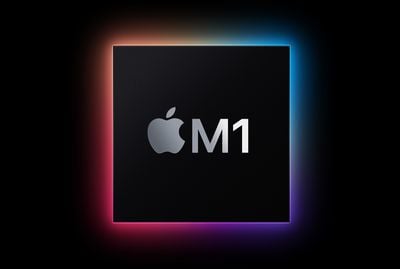In a new interview with Om Malik, Apple's software engineering chief Craig Federighi, marketing chief Greg Joswiak, and chipmaking chief Johny Srouji discussed the motivations behind Apple Silicon, how Apple is able to differentiate itself from its competitors, and why chip specifications are becoming irrelevant.

Joswiak explained that Apple Silicon represents the completion of Steve Jobs' vision to make "the whole widget" for the Mac:
Steve used to say that we make the whole widget. We've been making the whole widget for all of our products, from the iPhone, to the iPads, to the watch. This was the final element to making the whole widget on the Mac.
When asked about how Apple views the technical specifications of its custom silicon, Srouji remarked, "It's not about the gigahertz and megahertz, but about what the customers are getting out of it." He went on to explain that specifications cannot represent how custom silicon can be "perfectly fit for the product and how the software will use it."
Federighi concurred, offering an example of how specifications cannot always indicate real-world performance:
The specs that are typically bandied about in the industry have stopped being a good predictor of actual task-level performance for a long time. Architecturally, how many streams of 4k or 8k video can you process simultaneously while performing certain effects? That is the question video professionals want an answer to. No spec on the chip is going to answer that question for them.
Srouji pointed out how Apple is in a unique position to engineer hardware and software symbiotically for a better overall result:
I believe the Apple model is unique and the best model. We're developing a custom silicon that is perfectly fit for the product and how the software will use it. When we design our chips, which are like three or four years ahead of time, Craig and I are sitting in the same room defining what we want to deliver, and then we work hand in hand. You cannot do this as an Intel or AMD or anyone else.
Federighi then elaborated on how close hardware and software integration can remedy some of the inherent physical limitations of hardware and resolve specific problems:
It is difficult to put more transistors on a piece of silicon. It starts to be more important to integrate more of those components closely together and to build purpose-built silicon to solve the specific problems for a system. Being in a position for us to define together the right chip to build the computer we want to build and then build that exact chip at scale is a profound thing.
As Srouji sees it, just as the clock speed of the chip inside an iPhone is unimportant, the same will be true for the Macs of the future. Instead, it will all be about "how many tasks you can finish on a single battery life," for example.
Federighi assured that for customers who do not yet have an Apple Silicon-powered Mac appropriate for their purposes, "their day will come. But for now, the systems we're building are, in every way I can consider, superior to the ones they've replaced."
See the full interview for more information.




















